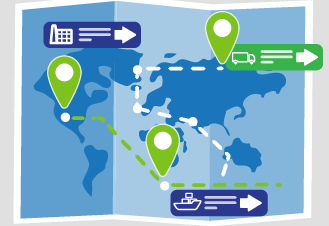
- Cross-border data transfers and supply chain integration. Manufacturing, logistics, and retail industries can benefit from comprehensive process innovation and digital transformation by adopting technologies such as software-as-a-service, Internet of Things (IoT), artificial intelligence (AI) and machine learning, real-time sensing technologies, and advanced analytics. Integrating these technologies can enhance the value chain within a company’s cross-border operations and optimize production plans, supply and demand prediction, lead times, and store inventory management.
- Cross-border data transfers and inventory management. Data gathered from various sources and geographies can help companies optimize their inventory levels and avoid unnecessary surpluses. AI solutions can leverage a vast amount of publicly available data gathered around the world to help predict how certain events—such as extreme weather and road conditions—may impact supply, production, and delivery.
- Cross-border data transfers and demand forecasting. Data analytics tools can be used to examine a vast amount of data that influenced past product demand. AI algorithms can be trained to use that information, combined with other data points to predict when a combination of factors will impact future demand. AI solutions can help companies reduce forecasting errors by 20 to 50 percent; and reduce lost sales caused by product shortage by up to 65 percent.
- Cross-border data transfers and transportation. Breakage of or malfunctioning of vehicles, vessels, and equipment used to load cargo can delay delivery and generate financial losses. Technologies that heavily rely on data flows can help optimize predictive maintenance, avoiding or greatly minimizing supply chain disruptions due to transportation delays. Predictive maintenance triggers an intervention when it is really needed and not just when it is pre-planned.
- Cross-border data transfers and product traceability. Tracking products through the various steps of their supply chain or tracing back their origin once they reach their destination can be done transparently, safely, and quickly using blockchain. This technology helps manage product recalls very efficiently, increasing consumer safety and reducing costs. Blockchain solutions rely on cross-border data to trace every phase of a product supply chain and can quickly and precisely identify the origin of a problem to help avoid untargeted “bulk” product recalls.

